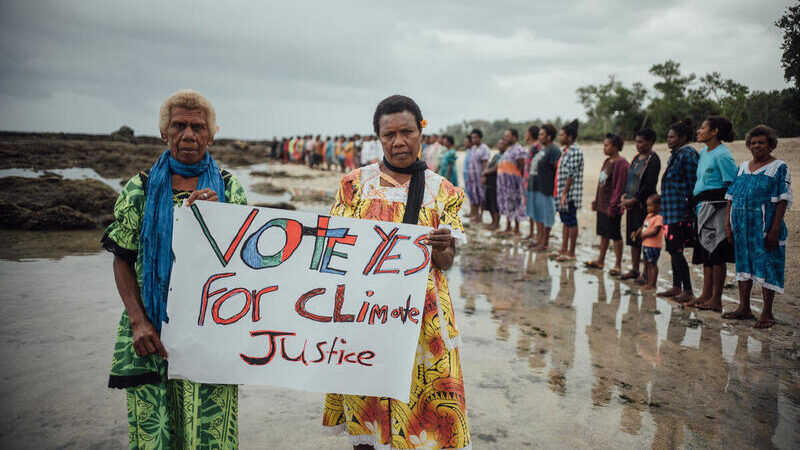
Joie Chowdhury is a senior attorney for the Center for International Environmental Law (CIEL)’s Climate & Energy Program. Lien Vandamme is a senior campaigner for CIEL’s Climate & Energy Program.
While major polluters at this year’s UN climate talks, COP29, brazenly failed to deliver the finance needed to remedy climate harm in yet another attempt to escape their obligations under international law, a key moment for climate justice is coming up. The historic hearings on climate change at the International Court of Justice (ICJ), scheduled for December 2-13, may help advance the case for climate reparations.
The hearings will inform the Court’s advisory opinion on the international legal obligations of states in relation to the climate crisis. The Court’s pronouncements can produce tangible impacts. While advisory opinions do not settle specific conflicts between states, they are definitive interpretations of binding law – and even considered instruments of preventive diplomacy.
One of the most contested issues at the heart of the ICJ climate advisory proceedings is the legal consequences that states face when they breach their climate-related obligations, and harm ensues. Those consequences may involve stopping harmful activities that damage the climate, ensuring they are not repeated, and providing full reparation, including restitution, compensation, rehabilitation, and satisfaction measures.
Specific measures are needed to remedy the wide range of harms caused by the climate crisis, both economic and non-economic. Measures beyond compensation could include phasing out fossil fuels or debt cancellation.
Loss and damage underfunded
In the face of rich countries’ avoidance and denial of their responsibility for having contributed the most cumulatively to the escalating climate crisis, clarity from the ICJ on states’ legal accountability is more urgent than ever. It took three long decades for states to agree on a fund to address climate harms, also known as loss and damage, under the UN climate negotiations.
Even now that the fund is in place, it remains woefully underfunded compared to the immense and rising need. Also, it is predicated on voluntary finance rather than obligatory contributions from states with a legal duty to pay for climate harm.
As the UN Secretary-General has emphasised, the UN Framework Convention on Climate Change (UNFCCC) loss and damage mechanisms are not currently structured to fulfill states’ obligations to provide effective remedies for climate-related harms.
EXPLAINER: What was decided at the COP29 climate summit in Baku?
And the UNFCCC process once again failed to address this massive funding gap: the latest summit, COP29, announced a new climate finance goal that is far too low and far too late, committing only to mobilise funds by 2035, without any guarantees the funding will be provided and grants-based – and without a designated sum for loss and damage.
This inaction reflects a pattern of powerful polluting countries evading their legal obligations and prioritising their own economic interests over the human rights of communities already bearing the brunt of the climate crisis.
Obligation, not charity
The ICJ now has a unique opportunity to affirm that accountability and reparations for climate damage are a matter of obligation and justice — not charity. Its opinion could shape global climate law and policy, empowering climate-vulnerable nations with legal tools to strengthen their positions in climate talks.
This could pave the way for holding polluters more accountable, particularly in areas like loss and damage and climate finance, inside the negotiation rooms and beyond. More practically, if the loss and damage fund continues to under-deliver, states and communities may well seek redress outside the UNFCCC and draw guidance from the forthcoming ICJ advisory opinion.
In its ongoing climate advisory proceedings, the Inter-American Court of Human Rights (IACtHR) is also considering a range of issues including state duties to guarantee the right to redress for climate harm. The IACtHR has a rich jurisprudence on remedy and reparation, including in the environmental context, such as in the La Oroya case. The IACtHR climate advisory opinion is expected in early 2025, before the ICJ advisory opinion, and could set the legal bar high for climate reparations.
People whose rights are harmed by climate impacts deserve remedy and reparation. The right to remedy and reparations is a long-standing fundamental tenet of international law, rooted in multiple frameworks such as the law of state responsibility and human rights law, and deeply anchored in ICJ jurisprudence. The legal frameworks to hold states accountable already exist. What is required now is their robust application in the context of climate change.
Legal first step
Without concrete remedy, climate justice and equitable multilateralism will remain hollow. International cooperation is crucial, yet it must be paired with tangible policies that explicitly address harm and hold those responsible to account. The time has come to halt the cycle of continuing harm and refusal to repair.
Most climate-vulnerable states and peoples have long emphasised the vital importance of redress for climate harm. The ICJ hearings will put all cards on the table. The world’s major polluters and the most climate-vulnerable nations will have their day in court. Civil society will closely monitor how states’ interventions in the courtroom align with claims of climate and human rights leadership.
All eyes now turn to the ICJ, but let’s be clear: the fight for climate accountability extends beyond the Court’s chambers. Legal clarity will serve as a first step, but law alone is not a solution for addressing climate harm, as the issue is deeply rooted in structural injustice.
Our biggest hope lies in the upsurge of people coming together across generations, campaigns and negotiations, in the courts and the streets, demanding justice in defence of people and the planet.


